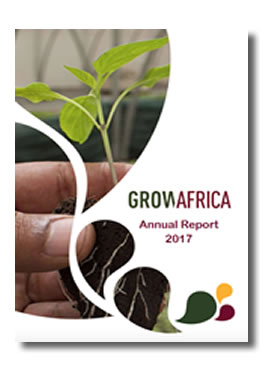Operating from its new base at the NEPAD Planning and Coordinating Agency, Grow Africa has continued to engage the private sector in meaningful ways that support the development of African agriculture.
Strategic Partnerships have been pursued with several institutions to work jointly towards achievement of common goals of investment mobilisation for agriculture and value chain development. These partners include Alliance for Green Revolution in Africa (AGRA), the Economic Commission for West African States (ECOWAS), African Development Bank (AfDB), German Development Cooperation (GIZ) and many others, with potato and rice as the two key crops that have been jointly supported in this regard.
The process of transition to an African base at the NEPAD Planning and Coordinating Agency in Johannesburg South Africa, completed this year. A team of 11 African-based officers have been hired covering regional and country engagements and Secretariat cross-cutting functions such as Communications, M&E, Finance and Procurement. Financial and procurement systems have now been integrated with those of the NEPAD Agency. Under governance and coordination, two Steering Committee meetings were held this year, with resolutions made to streamline the governance structure into an Advisory Council and a Future Funding mobilization committee. A new private sector engagement model was also adopted.
In continued efforts to mobilise high level commitment to policy reform, Grow Africa hosted two private sessions at the World Economic Forum for Africa held in Durban, South Africa to identify opportunities for alignment between private and public sector investments in agriculture and facilitate greater returns. Several key recommendations emerged from the two sessions, and these are being escalated at subsequent engagement platforms of Grow Africa at national, regional and continental level for action. Further events were held during AGRF17 and the CAADP Partnership Platform to introduce a new private sector engagement model.
A new Private Sector Engagement Framework was jointly developed by African Union Commission and the CAADP team at NEPAD Planning and Coordinating Agency. Known as the Country Agribusiness Partnership Framework (CAP-F), the framework was launched during the 13th Annual CAADP Partnership Platform meeting in Kampala in May 2017. CAP-F deployment has rolled out in Uganda and Senegal, commencing with the country stocktaking process, with prospects to roll out in six additional countries in 2018.
Mobilising Investment for African Agriculture - Grow Africa supported session development on “Closing the Deal-Investing in African Agriculture” at AGRF17, which focused on moving the agribusiness agenda forward on priority value chains. Potential exists to unlock US$470 million in private sector investment pledges for the rice value chain, as well as nearly US$500 million infrastructure investment to improve access to farms and markets for rice.
Private sector engagement – At country level, Grow Africa engages the private sector through multistakeholder platforms and private sector bodies. New platforms were launched in Benin and Cote d’Ivoire focusing on pineapple and rice respectively. In Benin the pineapple platform was formed in collaboration with the Benin Pineapple Interprofessional Body and will support national strategies to increase production and marketing in regional and international markets. In Cote d’Ivoire the platform was launched in collaboration with the Office National de Developpement de la Riziculture (ONDR).
In Kenya collaboration continued with the National Potato Council of Kenya and Alliance for Green Revolution in Africa in the potato value chain. Grow Africa provided the potato platform with a grant that supported development of the County Potato Strategy in Nyeri, with similar work to be undertaken in Nakuru, Narok, and Meru Counties. The platform has facilitated market linkages for three farmer groups selling an estimated 34,000 metric tonnes of potato within the year at a market price of Ksh2 higher compared to prevailing traders’ prices. Over 3,000 farmers have been registered on an ICT platform that connects them to other farmers and supplies technical advisory information.
The work of the potato consortium in Kenya is to be extended to Tanzania, where Grow Africa and AGRA have partnered with the Tanzania Horticulture Association (TAHA) in Northern Tanzania to formalise a potato platform.
The Commercial Agriculture Support Services (CASS), is Grow Africa’s engagement partner in Malawi. The platform was formally launched during the year, and Grow Africa is finalising a financing grant to support organisational development and capacity development of the secretariat. Through CASS, blended finance models are being developed to support legumes development, with US$1.5 million already guaranteed. A similar grant is under preparation for Rwanda, where Grow Africa has partnered with the Rwanda Horticulture Working Group.
In Nigeria and Ghana, Grow Africa supports the national cassava platforms in partnership with the Sustainable Trade Initiative (IDH). The two platform secretariats received two-year operational grants from Grow Africa and IDH to support member mobilisation and registration, organisational development and building of business cases




